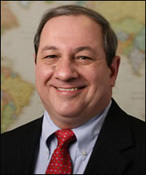
Political scientist George A. Lopez, the Rev. Theodore M. Hesburgh, C.S.C., Professor of Peace Studies, is spending the 2009–10 academic year at the United States Institute of Peace on a Jennings Randolph Senior Fellowship. During his residence at the institute in Washington, D.C., Lopez is working on a new book tentatively titled Can Sanctions Be Saved?
His background studying sanctions dates to the 1980s, when he was examining comprehensive trade sanctions (CTS) as policy tools for dealing with ongoing repression and human rights abuses. In the mid-1990s, he turned his attention to the U.N. Security Council's use of a new kind of economic measure designed to promote peace and stability: multilateral targeted sanctions (MTS), commonly referred to as "smart" sanctions.
"Whereas CTS are imposed against sovereign national governments," Lopez says, "MTS are aimed exclusively against specific decision-making elites [as well as] individuals and entities that are suspected of violations of international law or existing Security Council rulings. … Every case of U.N. sanctions since 1994—16 in all, with 11 still active—has been MTS."
However, despite their prevalence and notable successful outcomes, particularly in Libya, Angola, and Liberia, he says MTS are being subjected to increased scrutiny, which is why he's writing Can Sanctions Be Saved?
Lopez explains that the sanctioning of non-state actors—for example, members of terrorist groups such as al-Qaida—creates more legal, political, and economic problems than taking action against governments. European courts recently have heard cases concerning the human rights implications of listing and delisting individuals and organizations, generally ruling in favor of the individuals involved.
The banking system further complicates matters, Lopez notes.
"The dynamic place of banks in the global financial architecture makes them absolutely key to the effective implementation of sanctions, but market forces provide them ample incentives to enforce all these sanctions with less enthusiasm than states would like."
To write the book, Lopez plans to interview about 150 personnel in the Department of State and the Department of the Treasury as well as United Nations officials, bankers, and others in the private and public sectors.
"With about 90 percent of the folks relevant to my project working in Washington or New York City, the Institute of Peace spot is perfect, [and it will allow me] to be present at a number of meetings that involve key sanctions people."
Lopez already has been involved with expert groups of current and past U.S. officials who are dealing with sanctions on Iran and North Korea. As a result, he is testifying before Congress in December and is the co-author of a major policy report to be published in January.